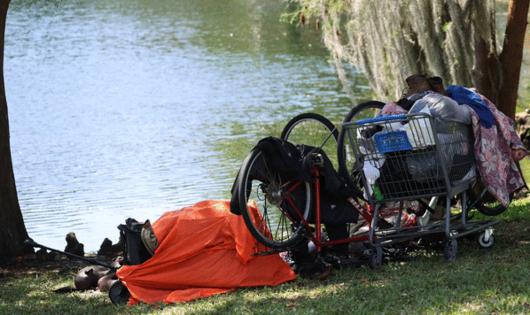Trump cuts to subsidized rent programs could displace hundreds in Orlando, advocates say
Published in News & Features
ORLANDO, Fla. — As part of an effort to reinvent how America handles its homeless, the Trump administration is slashing funding to long-term housing programs, a decision advocates fear will force many of Central Florida’s disabled and most vulnerable back out onto the streets.
“The people who are participating in these programs are people who have limited ability to work and limited ability to access income,” said Martha Are, the CEO of the Homeless Services Network. “If they lose the support services and that partial rental subsidy, they won’t be able to function.”
The administration’s new priorities and rules for funding were revealed Thursday evening as part of a $3.9 billion “Notice of Funding Opportunity,” for which state and local governments and homelessness providers can apply for federal funding – the largest single source of money to combat homelessness. The tranche of funding allowed for permanent housing programs is now capped at 30%.
Instead, the new plan prioritizes drug and mental health treatment, temporary transitional housing and street outreach work to bring unsheltered people into services. It adds a work requirement to those receiving rental assistance.
Among the programs facing substantial cuts is one called Permanent Supportive Housing, which matches someone experiencing homelessness with an apartment they can afford.
In Orlando, some 1,600 people are in such apartment units, though the funding cuts appear to affect only about half. The other half, about 800, are veterans whose housing subsidy comes from the U.S. Department of Veterans’ Affairs — apparently spared from the change.
People supported by the program pay 30% of their income toward rent and utilities, and a subsidy covers the rest. Along with their apartment, they have access to a host of services ranging from mental health and drug treatment to budgeting assistance and life skills coaching.
To qualify for such a unit, a person must have been previously homeless and have a permanent disability. Many who qualify are seniors.
Are estimated that the agency overseeing such services in Orange, Seminole and Osceola Counties would lose about 40% of its subsidized Permanent Supportive Housing units, affecting several hundred people.
“We’ll absolutely be losing access to resources that are currently helping people,” she said. “And the path for how those people can move forward without being homeless again is not clear at this point.”
The new plan also encourages policies that allow law enforcement to clear encampments, reflective of a law encouraged by the right-leaning Cicero Institute and passed last year by Florida lawmakers.
The Cicero think tank was also a major influence on the Trump Administration’s decision to dismantle “Housing First,” the predominant anti-homelessness strategy for decades, of which the new Notice for Funding Opportunity is a critical piece.
In a news release announcing the changes, Housing and Urban Development Secretary Scott Turner declared that Housing First had failed. He said such programs “incentivized never-ending government dependency.”
“Our philosophy for addressing the homelessness crisis will now define success not by dollars spent or housing units filled, but by how many people achieve long-term self-sufficiency and recovery,” Turner said.
Among the justifications for the changes is that homelessness nationwide is at an all-time high. But the new plan doesn’t acknowledge the severe shortage of affordable apartments nationwide, as well as how working people have been priced out of markets around the country by skyrocketing housing costs and wages that haven’t kept up with inflation.
Are said that many in Permanent Supportive Housing, because of their condition, either can’t work or can’t work enough to afford an apartment without the subsidy.
According to Rent.com, the average one-bedroom in Orlando is $1,409 and the average two-bedroom is $1,795. The Orlando Sentinel reported this week that the metro area is 49th among the 50 largest in wages.
Without the subsidy, it’s likely many will become homeless again, said Jesse Rabinowitz, a spokesman for the National Homelessness Law Center.
“Our analysis is that over 170,000 people, primarily people with disabilities or seniors, who were once homeless and are now stably housed, will be kicked out of their housing,” he said. “It will have long-term ramifications on people’s lives….more people are going to suffer.”
_____
©2025 Orlando Sentinel. Visit orlandosentinel.com. Distributed by Tribune Content Agency, LLC.







Comments